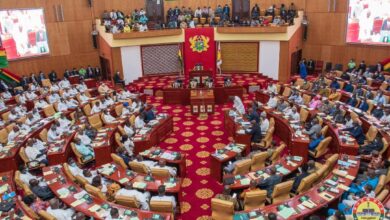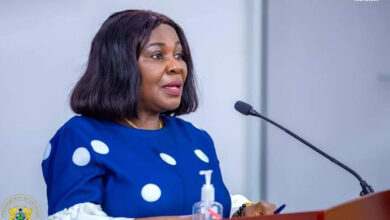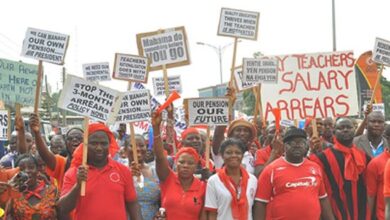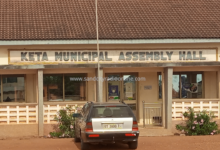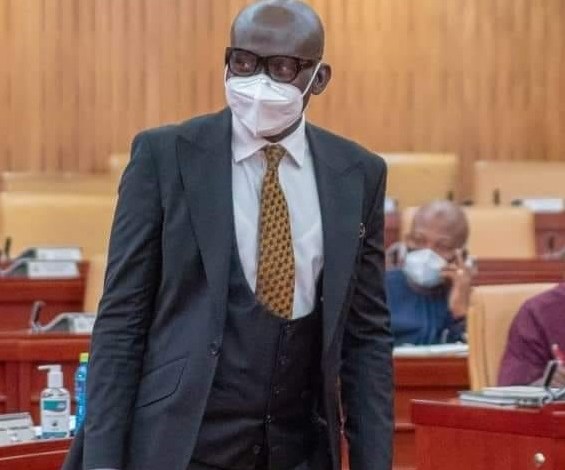
Attorney general-designate Godfred Dame says the controversial Agyapa deal was done in the best interest of Ghanaians
Minister for Justice and Attorney General-designate, Godfred Yeboah Dame, has assured Ghanaians that the Agyapa transaction to monetise some of Ghana’s gold royalties was done in the national interest and in accordance with law.
Appearing before the Appointments Committee last week, Dame argued the finance minister, his deputy and promoters of Agyapa were unfairly criticized in the controversial report of the special prosecutor.
Haruna Iddrisu, the Minority Leader, who is also a lawyer, seemed visibly surprised when the nominee stated that Martin Amidu did not interview Ken Ofori-Atta, his deputy, Charles Adu Boahen and anybody else involved with the transaction before he concluded his damning report on the transaction in October last year.
Dame told the Committee that at every step of the way, the Ministry of Finance and, for that matter government, put the interest of the nation first and not the interests of any individual, organisation or group of persons.
“Mr. Chairman, with all respect, I don’t see any vitiating factor with regard to the transaction,” he said.
Signing authority
The special prosecutor, on his own, called for documents covering the transaction and came up with an anti-corruption risk and risk of corruption assessment on the deal done under the mandate of the Minerals Income Investment Fund(MIIF), which was set up by an Act of Parliament passed in 2018.
Dame, who was then a deputy attorney general, invited parliamentarians to ignore the indicting aspects of the report because the whole exercise was undertaken not as a criminal investigation but an “assessment” and one that breached the basic natural justice rule of allowing the one under scrutiny to be heard.
He described Amidu’s report as a mere “opinion” of no direct legal effect.
Addressing one of the observations of the report concerning whether or not the country’s laws were breached because a deputy finance minister then Charles Adu Boahen signed for government, Dame explained the law gives authority to the Finance Minister to allow his deputy or any other person not below the rank of director to sign such documents.
“The capacity to execute a financial agreement, has been indicated in the Public Financial Management Act, 2016(Act, 921). In there, you find that Mr. Chairman, the capacity is given to the Minister for Finance or any person that the Minister for Finance may authorise,” Dame stated.
“In the light of this, it becomes quite clear that the Deputy Minister for Finance, if he was authorized by the Minister for Finance, has full capacity to enter into the agreement,” the Attorney General-designate added.
Parliamentary approval not required
A major subject of disagreement pertaining to the corruption risk assessment carried out by Amidu is his findings that the Mandate Agreement between the lead transaction advisor, Imara, and its local partner, Databank Group, was unconstitutional because it should be treated as “an international transaction” and, by that, required the approval of Parliament.
Dame disagreed, arguing that the transaction advisory role was not the main transaction but an agreement to build the structure and building blocks towards the ultimate objective of listing the Agyapa Royalties company on both the London and Accra stock markets.
“I will submit finally that to the extent that Parliament had considered and approved the substantive agreement itself, the primary agreement being the Minerals Royalties Agreement, other agreements like the approval of a transaction advisor ought not to have come before this honourable House for approval,” he told the 26-member Appointments Committee of Parliament.
Dame maintained that a contract to facilitate the main transaction cannot be viewed as a major transaction regardless of the fees.
Imara and its local partner, Databank, stood to earn a percentage of the amount raised for the listing as success fee capped at $4m to be shared between the two.
Imara is on a $15,000 monthly retainer, which the contract states will be deducted from the success fee at the end of Initial Public Offering (IPO). Databank’s partnership deal with Imara excluded the Ghanaian entity from the monthly retainer, and billed to be paid at the end of the floatation in success fee.
He reminded the House that on a regular annual basis, the transaction advisors involved in Eurobond issuance or facilitators of loan agreements ordinarily get paid a percentage of the total amount, which can be easily more than the $4m involved here and yet it is accepted as not at all necessary to present such incidentals deals to Parliament.
Dame, who was also a member of the board of the Public Procurement Authority(PPA) took issue with the SP, who resigned last November, for raising issues with the Request for Proposal, which allowed any of the shortlisted companies approved by the PPA to have a local partner.
Dame, who sat on the PPA board over the previous term, saw nothing irregular about it.
He also defended Databank’s reputation over the last 30 years and their ability to have worked with virtually all governments based on merit.
This came in when the issue of potential conflict of interest was raised because Ken Ofori-Atta is a co-founder of the investment bank and Ghana’s leading securities company.
Fair hearing
Dame faulted the Office of the SP and its former chief prosecutor, Martin Amidu, for breaking the rules of natural justice, when it refused to give all persons implicated in his corruption risk assessment a fair hearing before he reached his conclusions in his report.
Background
In 2018, Parliament passed the Minerals Income Investment Fund Act, 2018 which establishes the fund to manage the equity interests of Ghana in mining companies and receive royalties on behalf of the government. The purpose of the fund is to manage and invest these royalties and revenue from equities for higher returns for the benefit of the country.
The government then, through the Minerals Income Investments Fund(MIIF), set up Agyapa Royalties Limited to monetize Ghana’s gold royalties. This was after Parliament on August 14, 2020, approved the Agyapa Mineral Royalty Limited agreement with the government of Ghana despite the walkout by the minority.
In exchange, the company plans to raise between $500 million and up to about $1 billion for the government on the Ghana and London Stock Exchanges to invest in developmental projects.
The deal, however, has become a topical issue following concerns first by the opposition National Democratic Congress leading up to the December 2020 general elections.
On August 14, 2020, a few days after approving an amendment to the MIIF Act, the Minority walked out during the approval process of the very transaction agreements, the facilitation of which the amendment to the Fund’s statute was amended.
Civil society groups quickly added their voices to the opposition, describing the Special Purpose Vehicle (SPV), being created then, Agyapa Royalties of Jersey, as not being transparent, potentially corrupt, under valued and that it must be suspended for greater stakeholder involvement, according to some of the dissenting voice.
The government has however insisted that the deal is in the best interest of the country. The President, last year, directed the Finance Minister and Attorney General to review the transaction agreements and make necessary adjustment to address some of the concerns raised by stakeholders, where appropriate.
Source: asaaseradio
